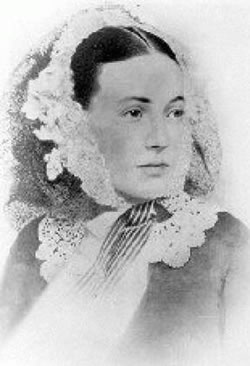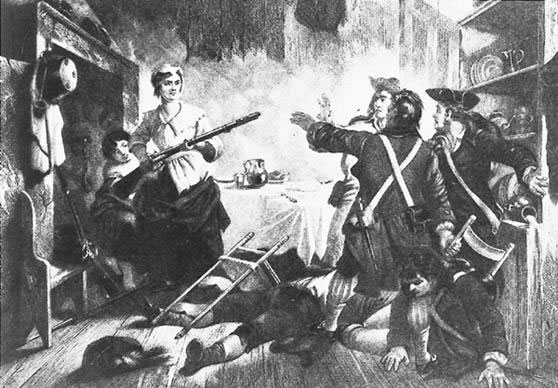 On April 17, 1865, eight days after General Robert E. Lee surrendered to General Ulysses S. Grant at Appomattox Courthouse, Union Cavalry Colonel Oscar LaGrange approached the tiny eastern Georgia hamlet of LaGrange. Colonel LaGrange (coincidentally named) and his battle-hardened cavalrymen expected skirmishes with home guard forces in and around Lagrange; however, the small force of horsemen came face-to-face with a “curious, odd, and singular spectacle,” the Nancy Harts.
On April 17, 1865, eight days after General Robert E. Lee surrendered to General Ulysses S. Grant at Appomattox Courthouse, Union Cavalry Colonel Oscar LaGrange approached the tiny eastern Georgia hamlet of LaGrange. Colonel LaGrange (coincidentally named) and his battle-hardened cavalrymen expected skirmishes with home guard forces in and around Lagrange; however, the small force of horsemen came face-to-face with a “curious, odd, and singular spectacle,” the Nancy Harts.
The Nancy Hart Militia, aka the Nancy Harts, consisted of forty women of LaGrange led by Nancy Hill Morgan and Mary Alfred Heard. They had been established as a militia unit organized to protect LaGrange early in 1861. With the help of Doctor A.C. Ware, the town physician, and a book titled “Rifle and Light Infantry Tactics” published in 1861 by William J. Hardee, the women learned drill and ceremony, battle tactics designed to protect LaGrange from Union invasion, and target practice. Within a few weeks of their inception the women had become superior markswomen, created a chain of command, and named themselves “The Nancy Harts,” in honor of Revolutionary War heroine, Nancy Hart.
Nancy Ann Morgan Hart was born in 1735 in the Yadkin River Valley of Western North Carolina. Shortly after her birth her family moved to the fertile Broad River Valley of Elbert County in north eastern Georgia. She was married at a young age to a Benjamin Hart from a prominent family. Among his descendants are Thomas Hart Benton, U.S. Senator from Missouri, and Kentucky Senator and orator, Henry Clay. Nancy’s family was also well connected to prominent figures in U.S. history. She was the first cousin of Revolutionary War General and later Representative from Virginia, Daniel Morgan. Although little is known about her early years in the Georgia frontier, it is known that Nancy, in adulthood, was a hardened frontierswoman, an excellent shot, feisty and hot headed. She stood nearly six feet tall and was severely scarred from a bout of smallpox and is thought to be, by some historians, crossed eyed. One early account of Nancy Hart states that she possessed, "no share of beauty—a fact she herself would have readily acknowledged, had she ever enjoyed an opportunity of looking into a mirror."
When the American Revolution came to Elbert County, Nancy, a Whig and ardent patriot was already being referred to as “Wahatche” or, “War Woman,” by local Native American tribes. She felt it was her duty to eradicate British sympathizers and Tories from the region. With her husband fighting for the Georgia militia, Nancy would often disguise herself as a man and wander into British encampments to gather information regarding troop movements and battle plans. She is also thought to have been an active participant in the Battle of Kettle Creek on February 14, 1779. In one account of her heroism, British forces descended upon her home demanding food. She sat the six soldiers down and began to feed them. During the meal, Nancy caught the troopers by surprise and took all six captive. Turning the prisoners over to Whig officials, she demanded that they be summarily hung for stealing her food. A subsequent discovery, in 1912, of six skeletons, thought to be over one hundred years old near the site of her former home may substantiate this fabled tale of her intrepidness.
 Nancy Hart continued to live in the Georgia frontier with her husband and eight children, six sons and two daughters, until the death of Benjamin in the late 1790s. A few years later, around 1803, Nancy’s oldest son John Hart moved the family to Henderson County, Kentucky. Nancy Hart lived out her remaining years there, passing away in 1830.
Nancy Hart continued to live in the Georgia frontier with her husband and eight children, six sons and two daughters, until the death of Benjamin in the late 1790s. A few years later, around 1803, Nancy’s oldest son John Hart moved the family to Henderson County, Kentucky. Nancy Hart lived out her remaining years there, passing away in 1830.
In the years that have followed her passing, Nancy Ann Morgan Hart has been recognized by Georgia officials as a major figure in the state’s history and has been memorialized numerous times by the state and individual organizations since her death. The Hartwell Dam and Hartwell Lake, created in 1962 and located north of Augusta, Georgia, are both named in her honor. The neighboring county to the north of Elbert County, was renamed Hart County, in honor of Nancy Hart. She is also found memorialized in name by Hart State Park and the Nancy Hart Highway, or Georgia Route 77. The National Society of the Daughters of the American Revolution Milledgeville, Georgia chapter is the Nancy Hart Chapter. In 1997, Nancy was inducted into Georgia Women of Achievement, which recognizes and honors women of Georgia who have contributed to the state’s development. Nancy Hart’s name resides within the GWA alongside that of Juliette Gordon Low, the founder of the Girl Scouts of America, Helen Dortch Longstreet, environmentalist, author, activist and wife of Confederate General James Longstreet, and Jeannette Pickering Rankin, the first woman elected to the U.S. House of Representatives.
Then there was the Nancy Hart Militia of LaGrange, Georgia. Upon Colonel LaGrange’s arrival in LaGrange he was met by Captain Nancy Morgan and a line of heavily armed and well organized Nancy Harts. Realizing that the all female militia was vastly outnumbered by the battle hardened Union Cavalry, Captain Morgan called for a formal parlay with Colonel LaGrange where she surrendered the unit and the town of LaGrange. Mrs. Morgan’s charm and hospitality were overwhelming to the Union colonel who, at the behest of Captain Morgan, over tea and cookies, spared the town from total destruction. The ladies who had once held weapons in the defense of LaGrange now bustled about acquiring food for the officers, establishing hospitals, and staffing medical stations for the wounded Union soldiers and Confederate prisoners of war from the Battle of Fort Tyler several days earlier. A plaque was placed in LaGrange by the State of Georgia which reads in part:
The Nancy Harts mobilized promptly, determined to resist any attempted depredations, but they were spared a trial at arms. Seeing the charmingly militant array formed to meet him, Colonel LaGrange complimented them upon their fearless spirit and fine martial air and, after a brief delay, marched on toward Macon, leaving no scar other than the broken railroad to deface this gracious Georgia town whose name he chanced to bear.
For the sake of history, Nancy Ann Morgan Hart should not be confused with Nancy Hart (later Nancy Hart Douglas), the hard riding Confederate markswoman, spy, guide, and guerilla fighter of the North Carolina Moccasin Rangers between 1862 and 1865.
